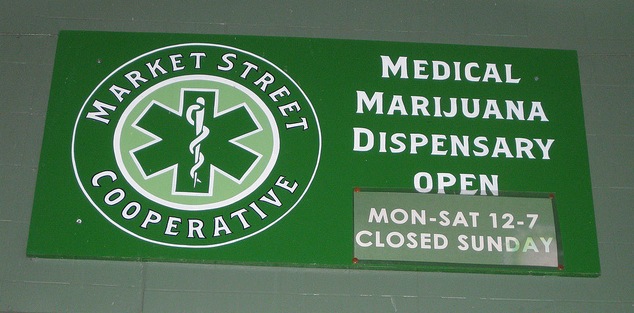“Even if one takes every reefer madness allegation of the prohibitionists at face value, marijuana prohibition has done far more harm to far more people than marijuana ever could.” -William F. Buckley, Jr.
How would you react to news that your child may not have long to live? Would you be willing to do almost anything necessary to save their life, if they faced death by a terrible, untimely illness?
This is just the dilemma that Mike Hyde of Missoula, Montana was faced with, as reported recently by the UK’s Daily Mail. Cash, his youngest son, had developed a severe brain tumor before age two, and was told the most painful news imaginable by doctors: baby Cash was unlikely to survive.
In addition to struggling with the illness, Cash had suffered nausea as a result of the sickness that followed radiation therapy, and had to receive sustenance with the use of a feeding tube. Desperate and wanting nothing more than to ease their son’s suffering, Mike and his wife Kalli decided they would try one last remedy–and a very controversial one, at that. In retrospect, however, the odd treatment may have saved the toddler’s life.
The Hydes, living in Montana where the use of marijuana for medical purposes is legal, wished to use cannabis oil to help stave off some of baby Cash’s ailments. The Daily Mail reported that, “Cash’s doctors refused to even discuss the option,” prompting Mike to seek the means of doing so off-the-cuff, so to speak, and subsequently began to treat his son anyway, with cannabis oil fed secretly through his son’s feeding tube.
“He also told doctors to stop giving Cash the cocktail of anti-nausea drugs he had been taking–although he never told them what he was doing,” the Mail reported. “Mr Hyde told KXLY News that his son started looking better right away.”
Could it indeed be possible that this young child’s life was saved by the introduction of cannabis oils into his system? Marijuana, even in the absence of being inhaled by smoking, is known to have a variety of curative effects, ranging from treatment for sufferers of ocular diseases like glaucoma, to general pain relief to the muscles and joints. Why then is the use of cannabis for medical treatment still considered so taboo?
In his book Reefer Madness, author Eric Schlosser points out a number of the early misconceptions about marijuana use that have helped contribute to its negative image, which remains to this day, particularly among law makers and legislators:
Political upheaval in Mexico that culminated in the Revolution of 1910 prompted a wave of Mexican immigration to the American Southwest. The prejudices and fears that greeted these peasant immigrant also extended to their traditional means of intoxication: smoking marijuana. Police officers in Texas claimed that marijuana incited violent crimes, aroused a ‘blood lust,’ and gave its users ‘super-human strength.’ Rumors spread that Mexicans were distributing ‘killer weed’ to unsuspecting American schoolchildren… Marijuana was depicted as an alien intrusion into American life, capable of transforming healthy teenagers into sex-crazed maniacs.
Phrases condemning the use of cannabis proliferated, with the press adopting sensational names like “murder weed” and “deadly dope” to drive home the message that marijuana was the avenue by which we could expect the coming of the Antichrist. As is so often the case, the eyes see and the mind believes, often without questioning the veracity of such claims whatsoever. Thus, American culture became hardened against the use of marijuana, and any potential benefits it might render have been viewed with fear and skepticism ever since.
There are a number of problems with this scenario, ranging from the treatment substances like cannabis receives at the hands of drug enforcement agencies, to the attitudes expressed by Big Pharma. To illustrate this, I’ll share a rather humorous story of my own: years ago, I had heard of a terrible new (and particularly disgusting) “danger-drug” making the rounds among American youth, called “jenkem.” A website called the Better Living Through Chemistry forums had carried images of a teenage schoolboy identified only as “Pickwick,” who had claimed to have bottled a mixture of human waste in a container for several days, and upon inhaling the methane fumes that gathered within, had achieved a hallucinatory state.
The Collier County Sheriff’s Department, upon learning of school children in the Naples area who had discussed the substance and its use, subsequently leaked a memo which borrowed almost verbatim from the initial “Pickwick” postings online, warning of the dangers associated with jenkem use among American teens. Around the time the original memo was leaked to the media, I learned of it, and since I was primarily skeptical that anyone would be willing to crap into a bottle and then sniff it days later to get a cheap buzz, I contacted the Drug Enforcement Agency (DEA) directly. By phone, I was connected with a polite man identified as a “Special Agent,” who was very helpful in answering my questions, and told me that jenkem was indeed considered a valid threat by DEA officials, and that there were a few valid reports they were following that pertained to its use.
This was just beyond bizarre, I thought. It all had to allude to a greater sense of depravity and, to be frank, sheer ignorance among our youth, if indeed such horrid hilarity could actually be taking place in bathrooms and garages around the country. I was still slow to give myself to the notion that what we were dealing with was indeed a realistic threat, however. Later, my suspicions were confirmed: “Pickwick” admitted to having hoaxed the entire matter, and About.com’s “urban legend guru” David Emery later concluded in a statement that news and media portrayal of Jenkem and its potential use had been “based on faulty Internet research.”
This often seems to be the case: if scare-tactics are appropriately administered, you can usually lure anyone into believing nearly anything, and that doesn’t merely apply to the general populace: we’re talking about plenty of folks just like you or I, with the same fears, impulses, and cultural biases, who take jobs working in government. Accidents can happen, and when the use of any substance is played up to having harmful effects, fear will often reign supreme over logic.
The same sorts of things tend to happen with the modern pharmaceutical industry. When more holistic, natural cures to ailments may exist, so many in the medical profession will treat these with dismissal and skepticism (such as young Cash’s doctors had done in the story outline earlier), and often while opting to prescribe costly medications. In many cases, these sorts of medications, if anything, don’t cure the conditions they were prescribed to treat: instead, they ward off the effects of things like nausea, mental illness, or a host of other ailments, effectively keeping a person in a functional, yet treatable state. It’s almost as if some medicines weren’t prescribed to cure people’s sickness at all: they might just as well keep them sick, but feeling just good enough to maintain those costly prescriptions indefinitely. Thus, folks end up in a limbo-like state of flux somewhere between being sick and ultimate wellness, and of course, pumping dollars back into the pharmaceutical industry.
Have you ever seen the film A Beautiful Mind starring Russel Crowe? In the film, Nobel Award-winning mathematician and Game Theorist John Nash begins to succumb to the effects of schizophrenia, and is eventually treated with antipsychotic drugs. The real John Nash, upon viewing the film, was rather perturbed to learn that his recovery had been portrayed as having resulted from the use of medication, since in truth he had refused to take such prescriptions. According to Sylvia Nasar, the author of the original biographical work upon which the film was based, Nash did in fact recover “gradually with the passage of time,” and in the absence of having taken prescription medication. According to Nash himself, he had claimed that his recovery occurred through gradual processes where he learned to “intellectually reject” his delusions, though he argued that he felt his best scientific theories occurred while he had suffered schizophrenia. As is often the case, brilliance seems to run tandem with madness.
But what if there are ways that some sufferers of mental illness could be helped to cope with their problems through learning to master the facilities of their own minds, rather than through the use of medications? The latter is the conventional “cure,” and arguably the easier approach, though for many this is also a costly remedy. Whether it be a question of rehabilitative therapy as described above, or the use of unconventional natural remedies like the cannabis oils that may have saved Cash Hyde’s young life, what will it take to finally remove the superstitious fallacies, as well as the general industrial bureaucracies, that may be hindering people’s true wellness?
Image by Dominic Simpson via Flickr.




Man, that killer-weed part compels me to post… this!
http://www.youtube.com/watch?v=B_27Hi1In6o&feature=related
As far as I’ve been able to find, this mention of marijuana in that particular song refers to the use of the drug amid the federal troops –the ones the Revolutionary soldiers referred as “los pelones” in a derogatory manner. The cockroach is also an allegory of Victoriano Huerta, the man who betrayed Madero and condemned my nation to a decade of bloody civil war –with the help of the American ambassador, I might add, but that’s another story 😛
I seriously doubt the drug was intended to give these men supernatural strength. Rather, it’s more likely that the marijuana was intended to sedate the pain of injuries suffered in battle, as well as possibly numb the senses in order to qualm anxiety and fear.
This posting of yours touches me on a rather personal level. Since the beginning of this year I’ve been suffering from annoying pain in my joints and articulations; I went to the doctor and he diagnosed me with arthritis –ar-FRAKING-thritis! and I’m not even 40 yet!– and since then I’ve been taking medication to help me treat the problem. Orthodox medicine tells me that currently there are no ways to actually cure me, and that I’m destined to remain under medication (quite expensive for me I might add) for the remainder of my life :-/